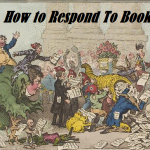
Engaging With Your Readers: Should Authors Respond to Readers’ Reviews? (Part 1) #writers #writing #selfpublish
 Engaging With Your Readers: Should Authors Respond to Readers’ Reviews?
Engaging With Your Readers: Should Authors Respond to Readers’ Reviews?
by Eve Wilson
If you have already published your first ebook and the online reviews have started to appear on such sites as Amazon or Smashwords, you may already know the temptation to respond to those reviews. This is especially true in the case of any negative reviews, which may have you itching to write a response in defense of your book or explaining to the reviewer that he or she has failed to understand it. Although bad reviews are inevitable for anyone who takes the decision to publish their work simply because tastes differ so widely, some negative reviews may be avoided by ensuring that readers are provided with sufficient information when they make their decision to buy—for example by offering free sample chapters. As an earlier blog post on Epublishabook.com explains: “A reader who does not like your style will simply not buy the book and have no reason to complain. If it happens nevertheless, most of the time, it is best to ignore it, or to hope that other readers will comment on that critic.”
Opening up the Floor for Debate
It is perfectly natural to feel this way. After all, you have probably put a great deal of work into your book and are proud of your achievement. It can be disheartening to see it summarily dismissed with a line or two of what may appear to be nothing more than a spiteful reaction and it would be easy enough to tap out your reply and hit send. However, is responding to reviews—especially hostile reviews—a good idea? Some people, both book authors and readers, feel that responding to any kind of review, whether glowing or less than complimentary, is ill-advised and that readers should be allowed to review and discuss books without the input of the author. On the other hand, some readers positively relish the opportunity to discuss and debate with authors and this may result in some interesting and intelligent discussions—as well as the opportunity for learning from even the most negative reviewer if the criticism is constructive and if you are able to keep your temper in the face of a negative response to your work. It may be helpful to keep in mind that any publicity is good, as Beth Bacon, writing for Digitalbookworld.com points out: “No matter what the customers say, those who write their comments on Amazon, Apple’s iTunes store, or BN.com are spending time and energy thinking about your book. They’re spreading the word.”